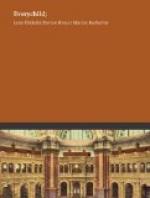“I?” replied Aladdin in surprise. “Why, because I am the most troubled child of all!”
Everychild could scarcely believe this. “And yet,” he said, “with your wonderful lamp you have only to wish for things, and they are yours!”
Aladdin made ready to tell his story. He adjusted himself more comfortably on the Oriental rug, and at last he sighed deeply. “The child who has everything is never happy,” he said.
Everychild simply could not believe this; and Aladdin read the disbelief in his eyes.
“It is true,” he said. “Having everything you wish for is like having more money than any one else. And in such a case, how could one be happy? How many things would be denied one!—pleasant solitude, simple friendships, even a good name. Those who had too little would envy you and hate you; and if you sought to relieve their distress they would hate you more than ever in their hearts, because you would have degraded them. You would have to be a spendthrift, which is vulgar, or you would have to be a miser, which is mean. There is an old saying in Chinese . . . how shall I put it in your language? Runnings fleet, unhampered feet. You see? The rich have pampered feet. At best they tread soft places. No, it is an evil thing to have too much. I would that the lamp had never been mine.”
“If it were mine,” said Everychild, unconvinced, “I think I should be happy.”
“To be happy,” said Aladdin, “means to want something and believe you are going to get it after awhile. But when you’ve got everything it is a good deal worse than not having anything. Because there’s nothing left for you to wish for. And wishing for things is really the greatest pleasure in the world.”
“But to wish for things, and never to get them?” said Everychild, deeply puzzled.
“Let me explain,” said Aladdin. “I remember when I was a little boy in Peking there came a spring when I wanted a kite. Oh, how I longed for a kite! And my mother said, ’Never mind, Aladdin. When your uncle comes back from Arabia, where he has gone with the camel train, perhaps he will bring you a kite!’ And I was very happy all the spring and summer, thinking I should have a kite when my uncle came back from the camel train. And it was not until the next year, when I no longer cared very much about having a kite, that I learned how my uncle had died in the desert, quite early in the spring the year before.”
“And then,” asked Everychild, “were you not unhappy?”
“No. You see, by that time I had begun to wish for something else. This time it was a pair of little doves which a merchant had brought from far away in the Himalaya mountains. And I dreamed by day and night of the time when I should own the little doves. No coin was too small to be saved. The little coins would become as much as a yen in time. And at last I was the proud possessor of a yen!”




